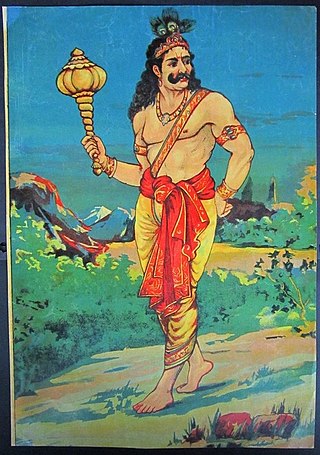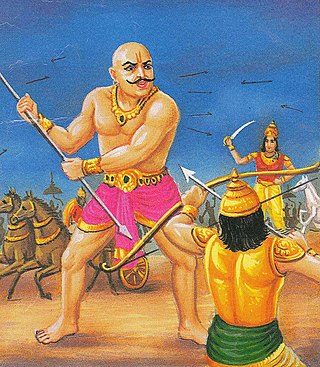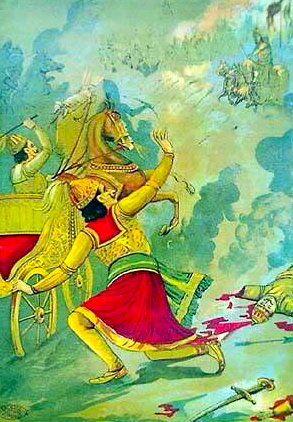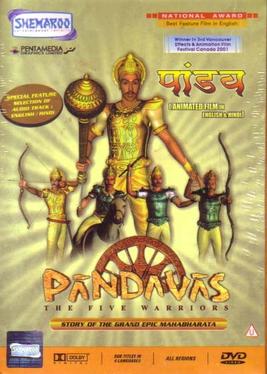Related Research Articles

Rākshasas are a race of usually malevolent beings prominently featured in Hindu mythology. They reside on Earth but possess supernatural powers, which they usually use for evil acts such as disrupting Vedic sacrifices or eating humans.

In the Hindu epic Mahabharata, Bhima is the second among the five Pandavas. The Mahabharata relates many events that portray the might of Bhima. Bhima was born when Vayu, the wind god, granted a son to Kunti and Pandu. After the death of Pandu and Madri, Kunti with her sons stayed in Hastinapura. From his childhood, Bhima had a rivalry with his cousins Kauravas, especially Duryodhana. Duryodhana and his uncle, Shakuni, tried to kill Bhima multiple times. One was by poisoning and throwing Bhima into a river. Bhima was rescued by Nāgas and was given a drink which made him very strong and immune to all venom.

Ghatotkacha is a prominent character in the story of Mahabharata. His name comes from the fact that his head was hairless (utkacha) and shaped like a ghatam, or a pot. Ghatotkacha was the son of the Pandava Bhima and the demoness Hidimbi, and thus a half-human, half-demon hybrid.

Duryodhana, also known as Suyodhana, is the primary antagonist in the Hindu epic Mahabharata. He was the eldest of the Kauravas, the hundred sons of the king Dhritarashtra and his queen Gandhari.

The Kurukshetra War, also called the Mahabharata War, is a war described in the Hindu epic poem Mahabharata , arising from a dynastic struggle between two groups of cousins, the Kauravas and the Pandavas, for the throne of Hastinapura. The war laid the foundation for the events of the Bhagavad Gita.

Jayadratha is the king of the Sindhu kingdom featured in the Mahabharata. He was married to Dushala, the only sister of the hundred Kaurava brothers. The son of the king Vriddhakshatra, he is killed by Arjuna. He has a son named Suratha.

Ekachakra is a small village, located 20 km away from the town of Rampurhat in the Birbhum District of West Bengal. Within Hindu tradition, the five Pandavas from the epic, Mahabharata are described as staying in Ekachakra during their years in exile. It is also famous as the birthplace of Nityananda Rama, a principal religious figure in the Gaudiya Vaishnava tradition.
The Panchala kingdom was one of the historical Mahajanapadas of ancient India. It was annexed into the Nanda Empire during the reign of Mahapadma Nanda. Ahichchhatra was capital of northern Panchala and Kampilya was capital of southern Panchala.
Kampil is a town and a Nagar panchayat in Farrukhabad district in the Indian state of Uttar Pradesh. It is located about 45 km from Farrukhabad, and 55 km from Budaun. It is a very important place from a historical point of view.

Kunti, born Pritha, is a prominent figure in the Hindu epic Mahabharata. Recognized for her pivotal role as the mother of Karna and the Pandavas, the central protagonists of the narrative, she is depicted as possessing notable beauty, intelligence, and shrewdness.

In the Hindu epic Mahabharata, Kichaka or Keechaka is the commander-in-chief of Matsya kingdom, the country ruled by King Virata. He was the younger brother of Sudeshna, the queen of Virata. Kichaka was a very powerful man and had immense strength. He saved Virata's kingdom many times from foes. He was killed by Bhima because he was harassing Draupadi and received a punishment.
Bakasura, also rendered Baka, is a rakshasa featured in the Hindu epic Mahabharata. The rakshasa lives in a forest which nowadays known as "Gangani" located near Garhbeta town of the Indian state of West Bengal. In exchange for protecting the kingdom from invaders, he terrorises its citizens, eating them at will. The weak king is rendered helpless. The people come to an arrangement with their tormentor: They would send him large provisions of food every week, which he would consume, along with the cart-driver who delivered them. In order to save the life of their Brahmin host when it is his turn to deliver the cartload, Bhima is eventually sent out to kill Bakasura, under the direction of his mother, Kunti.
The Adi Parva or The Book of the Beginning is the first of eighteen books of the Mahabharata. "Ādi" in Sanskrit means "first".

The Bhishma Parva, or the Book of Bhishma, is the sixth of eighteen books of the Indian epic Mahabharata. It has 4 sub-books and 124 chapters.
The Drona Parva, or the Book of Drona, is the seventh of eighteen books of the Indian epic Mahabharata. Drona Parva traditionally has 8 parts and 204 chapters. The critical edition of Drona Parva has 8 parts and 173 chapters.

The Karna Parva, or the Book of Karna, is the eighth of eighteen books of the Indian Epic Mahabharata. Karna Parva traditionally has 96 chapters. The critical edition of Karna Parv has 69 chapters

Kalpeshwar is a Hindu temple dedicated to Shiva located at an elevation of 2,200 m (7,217.8 ft) in the picturesque Urgam valley in the Garhwal region of Uttarakhand state in India. The temple's ancient legend linked to the Pandavas, heroes of the epic Mahabharata, is the fifth temple of the Panch Kedar of Shiva's five anatomical divine forms; the other four temples in the order of their worship are Kedarnath, Rudranath, Tungnath and Madhyamaheshwar temples; all in the Kedar Khand region of the Garhwal Himalayas. Kalpeshwar is the only Panch Kedar temple accessible throughout the year. At this small stone temple, approached through a cave passage, the matted tress (jata) of Lord Shiva is worshipped. Hence, Lord Shiva is also called as Jatadhar or Jateshwar. Earlier it was approachable only by 12 km (7.5 mi) trek from the nearest road head of Helang on the Rishikesh-Badrinath road but now the road goes up to Devgram village from where the trek now is just 300 metres. This road is good for bikes or cars with good ground clearance as it is a half-paved road which may get damaged during monsoons. Small cars can be taken except in monsoons.

In the Hindu epic Mahabharata, Vikarna was the third Kaurava, a son of Dhritarashtra and Gandhari, and a brother to the crown prince Duryodhana. Vikarna is also referred to as the third-most reputable of the Kauravas. Vikarna was the only Kaurava who opposed the humiliation of Draupadi, the wife of his cousins of the Pandavas after Yudhisthira lost her freedom in a game of dice to Duryodhana.

Pandavas: The Five Warriors is a 2000 Indian English-language animated Hindu mythological film directed by Usha Ganesh Raja and produced by Pentamedia Graphics. Based on the five Pandava brothers from the Indian epic Mahabharata, it is India's first computer-animated film, and won the National Film Award for Best Feature Film in English.
References
- ↑ "The slaying of Baka". thehindu.com. 13 February 2014. Retrieved 12 October 2023.